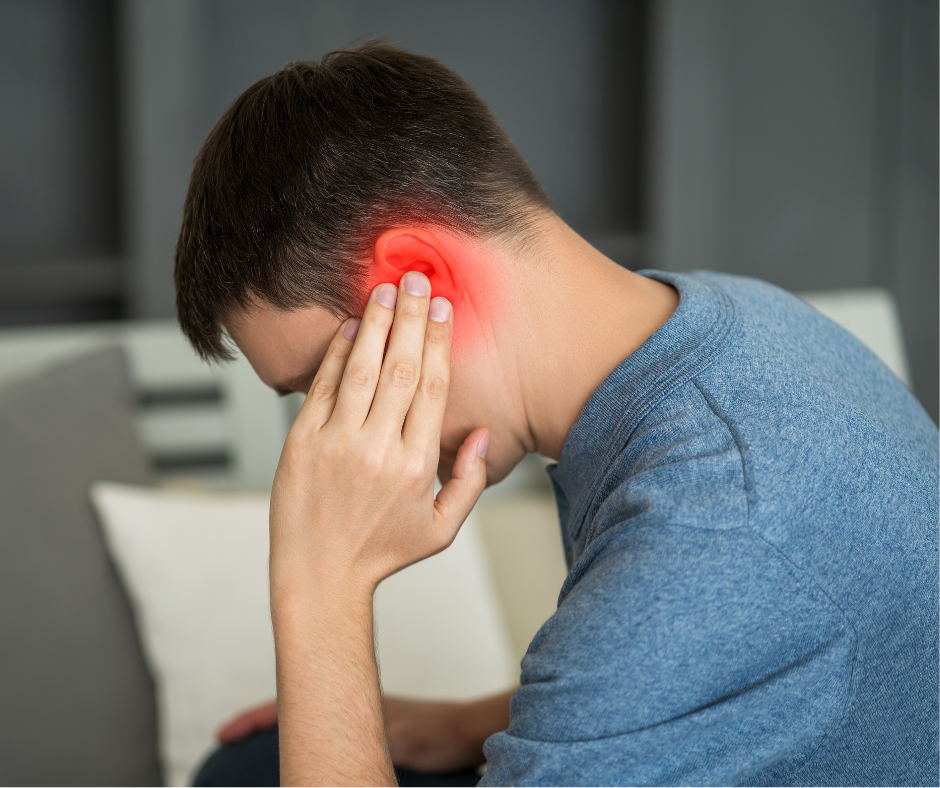24/7 online booking

Can Osteopathy Help Tinnitus? Exploring a Holistic Approach to Ear Health
Tinnitus is a condition that affects millions of people, characterised by the perception of ringing, buzzing, or other noises in the ears that have no external source. It can range from a mild annoyance to a debilitating issue that impacts daily life. As sufferers seek relief, many explore various treatment options, including osteopathy. But can osteopathy help with tinnitus? In this blog, we'll delve into how osteopathic treatment may offer support for those dealing with this challenging condition.
Understanding Tinnitus
Tinnitus is not a disease itself, but rather a symptom of an underlying issue. The causes of tinnitus can be varied and complex, including:
- Exposure to loud noise: Prolonged exposure to loud sounds can damage the tiny hair cells in the inner ear, leading to tinnitus.
- Ear infections or blockages: Earwax build-up, infections, or blockages can cause or exacerbate tinnitus.
- Age-related hearing loss: As we age, the delicate structures of the ear can deteriorate, potentially leading to tinnitus.
- Head or neck injuries: Trauma to the head, neck, or jaw can affect the nerves, blood flow, or muscles in these areas, sometimes resulting in tinnitus.
- Stress and anxiety: Emotional stress and anxiety can worsen the perception of tinnitus.
Given this wide range of potential causes, tinnitus treatment often requires a multi-faceted approach, addressing both the symptoms and any underlying conditions.
How Can Osteopathy Help with Tinnitus?
Osteopathy is a holistic approach to healthcare, focusing on the body's structure and its relationship to overall health and function. While osteopathy is traditionally associated with musculoskeletal issues, it may also offer benefits for those experiencing tinnitus, particularly when the condition is linked to physical factors such as muscle tension, joint dysfunction, or circulatory issues.
1. Addressing Musculoskeletal Tension
One of the ways osteopathy may help tinnitus is by addressing tension in the muscles and joints of the neck, jaw, and upper back. Tight muscles, particularly in the neck and jaw, can contribute to or worsen tinnitus by affecting the alignment and function of the surrounding structures.
Osteopaths use gentle manual techniques to release tension, improve mobility, and restore balance to these areas. For example:
- Neck treatment: If your tinnitus is related to tension or misalignment in the cervical spine, osteopathic treatment may help by improving posture, reducing muscle tightness, and enhancing blood flow to the head and ears.
- Jaw and TMJ: Dysfunction of the temporomandibular joint (TMJ), which connects the jaw to the skull, is sometimes associated with tinnitus. Osteopathic techniques can help realign the jaw, reduce tension, and improve the function of this joint.
2. Improving Circulation
Circulatory issues can sometimes contribute to tinnitus, particularly if the condition is related to reduced blood flow to the ears. Osteopathy aims to improve overall circulation through gentle manipulation and mobilisation techniques, helping to ensure that the tissues in the head and neck receive adequate oxygen and nutrients.
By enhancing blood flow, osteopathy may help reduce the intensity of tinnitus symptoms, particularly in cases where poor circulation is a contributing factor.
3. Supporting the Nervous System
Osteopathy also focuses on the nervous system, which plays a critical role in how we perceive sound. Through cranial osteopathy—a specialised approach that involves gentle manipulation of the skull, spine, and sacrum—osteopaths aim to relieve tension and improve the function of the nervous system. This may help to calm the heightened neural activity that is often associated with tinnitus.
4. Holistic Lifestyle Advice
As part of a holistic approach to health, osteopaths may also provide advice on lifestyle factors that could be contributing to your tinnitus. This might include guidance on managing stress, improving posture, and adopting relaxation techniques, all of which can play a role in reducing the severity of tinnitus.
What to Expect from Osteopathic Treatment for Tinnitus
If you're considering osteopathy as a treatment for tinnitus, it's important to have realistic expectations. While some patients report significant improvements, osteopathy may not cure tinnitus entirely, particularly if the condition is related to irreversible factors such as age-related hearing loss.
However, many people find that osteopathic treatment can help reduce the intensity of their symptoms, improve their overall wellbeing, and enhance their ability to manage the condition.
During your initial consultation, your osteopath will take a detailed medical history and conduct a thorough physical examination to identify any musculoskeletal issues that may be contributing to your tinnitus. Treatment will be tailored to your specific needs, focusing on relieving tension, improving circulation, and supporting the nervous system.
Conclusion
Tinnitus can be a frustrating and challenging condition to live with, but there are various treatment options available that may help alleviate symptoms. Osteopathy offers a holistic approach that addresses the physical aspects of tinnitus, particularly when it is linked to musculoskeletal tension, circulatory issues, or TMJ dysfunction.
If you're struggling with tinnitus and are curious about how osteopathy could help, consider booking a consultation with a registered osteopath. By working together, you can explore a tailored approach to managing your tinnitus and improving your quality of life.
If you would like to book and appointment with us, you can do so by clicking here.

Leave a comment